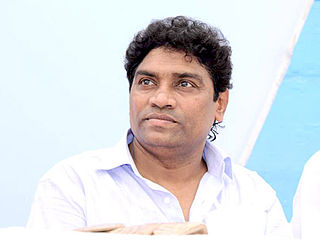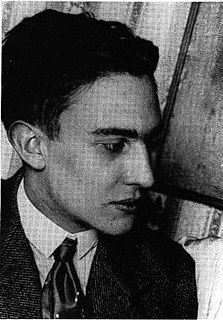A Quote by Johnny Lever
My poverty taught me a lot. If someone dies, I cannot cry as I have seen so much hardship and death. I went to shoot even the day my dad had died. Death is reality.
Related Quotes
I was in Korea. I've noticed all my life I see elderly people who have been close to death in an illness and they're absolutely cured and they say, now I know how to live my life. I've seen death. That happened to me when I was 19. It was a terrible, terrifying thing. And I live my life like those people decided to do when they were old. So, since I was 19, I've had the most fun possible every single day, even when I had a rough life. It was the army which taught me about life, and the theater which taught me how good it could be.
And he remembered thinking then that if she died, he was certain he wouldn't cry. For it would be the dying face of an unknown, a street face, a newspaper image, and it was suddenly so very wrong that he had begun to cry, not at death but at the thought of not crying at death, a silly empty man near a silly empty woman.
Someone's killed 100,000 people. We're almost going, "Well done! You killed 100,000 people? You must get up very early in the morning! I can't even get down the gym. Your diary must look odd: 'Get up in the morning, death, death, death, death, death, death, death - lunch - death, death, death - afternoon tea - death, death, death - quick shower ...' "
In my incoherence I was grateful that for a few moments I had known what it was to suffer-or so I thought. But nothing is less like a thing that that which is closest to it. A man who had been near to death thinks how he knows death. When the day finally comes for him to meet it, he does not recognise it. 'This is not it,' he says, as he dies.
Ageing destroys youth, sickness destroys health, degeneration of life destroys all excellent qualities and death destroys life. Even if you are a great runner, you cannot run away from death. you cannot stop death with your wealth, through your magic performances or recitation of mantras or even medicines. Therefore, it is wise to prepare for your death.
By 'coming to terms with life' I mean: the reality of death has become a definite part of my life; my life has, so to speak, been extended by death, by my looking death in the eye and accepting it, by accepting destruction as part of life and no longer wasting my energies on fear of death or the refusal to acknowledge its inevitability. It sounds paradoxical: by excluding death from our life we cannot live a full life, and by admitting death into our life we enlarge and enrich it.
Misunderstanding may arise by confusing the Buddhist and scientific definitions of death. Within the scientific system you spoke quite validly of the death of the brain and the death of heart. Different parts of the body can die separately. However, in the Buddhist system, the word death is not used in that way. You'd never speak of the death of a particular part of the body, but rather of the death of an entire person. When people say that a certain person died, we don't ask, "Well, which part died?"
Many that live deserve death. And some that die deserve life. Can you give it to them? Then do not be too eager to deal out death in judgement. For even the very wise cannot see all ends. I have not much hope that Gollum can be cured before he dies, but there is a chance of it. And he is bound up with the fate of the Ring. My heart tells me that he has some part to play yet, for good or ill, before the end; and when that comes, the pity of Bilbo may rule the fate of many - yours not least.


































